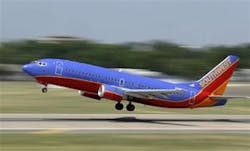D/FW is Not Alone in Pursuit of Southwest Airlines
The Wild Turkey arrives regularly at Southwest Airlines headquarters, coming from cities and airports all across the nation.
So do cakes, cards and pizzas, not to mention offers of millions of dollars in incentives. The goodies appear courtesy of suitors who are desperate to attract Southwest's low-fare air service to their airports.
But for years, Southwest executives have steadfastly insisted that none of it matters. Strategic decisions are made on one basis alone, they say -- whether an airport is a good place for Southwest to do business. No amount of persuading, pleading or pie makes any difference.
That's the challenge facing officials with Dallas/Fort Worth Airport as they embark on the latest phase of their quest to persuade Southwest to begin long-haul service from their airport.
Airport officials began a "charm offensive" last week with a $350,000 advertising campaign sending the message that D/FW and Southwest make a perfect match.
The airport has dangled incentives valued at $22 million before Southwest and has offered to build a new terminal specifically for the airline.
And officials tout a survey that shows heavy public support for Southwest flights at D/FW.
But Southwest executives maintain that the decision has already been made -- they will not serve D/FW anytime in the foreseeable future.
"We've probably studied D/FW more than any airport out there," said Ed Stewart, a Southwest spokesman. "We've tried to come up with ways to make it work."
Ultimately, he said, the negatives at D/FW outweigh potential profits.
"It just doesn't make sense for us," he said. "And we are not going to change our minds."
The only way Southwest will offer long-haul service from North Texas, Stewart said, is if the Wright Amendment -- the law that restricts flights from Dallas Love Field to states surrounding Texas and three others -- is repealed. That would allow the airline to fly unrestricted from Love, its home base.
But D/FW airport officials are holding onto hope.
"We owe it to all the people who depend on D/FW Airport to give it our best shot," said Joe Lopano, the airport's executive vice president of marketing. "We think we have a good argument to make."
Southwest has been courted by countless airports for years, since the U.S. Transportation Department documented the so-called "Southwest effect." That's the tendency for airfares to drop dramatically after Southwest begins service in a market.
So airports, noting Chairman and co-founder Herb Kelleher's fondness for Wild Turkey, have sent cases of the Kentucky bourbon to his office, usually with a request for a meeting.
In 1997, the state of Virginia erected billboards around Southwest headquarters begging the airline to go to that state. The airport in Milwaukee added Southwest signs in its terminal building, hoping that the airline would get the hint and begin service.
Southwest Airlines launched service in Norfolk, Va., in 2001. But the terminal signs didn't help Milwaukee-- Southwest still isn't in Milwaukee. But that hasn't stopped hundreds more cities, states and airports from sending proposals and requesting meetings every year, pitching the advantages of their communities.
But as much as Southwest officials appreciate the attention, Stewart said, it just doesn't work. New airports are added only after rigorous analysis of the market, and they must meet a very high standard for long-term growth and profitability.
The decision to add new cities is made under intense secrecy, with many city officials unaware that their airports are actively being considered. The final decision is made by Kelleher with input from Chief Executive Gary Kelly on a recommendation by Pete McGlade, vice president of schedule planning.
That's one of the reasons that Southwest has pulled out of only two markets -- Denver and Beaumont -- in its history, Stewart said.
"We want to open up shop on Monday and be profitable by Tuesday," he said.
He pointed to the airline's newest city, Fort Myers, Fla., which was announced this month. That community is a perfect fit for Southwest, he said. It is fast-growing, the airport is not dominated by a single airline, and it's small enough that Southwest can meet its strict standards for efficiency.
D/FW doesn't meet those criteria, he said. Although the airline could make money there, the risks would be great, he said, in large part because Southwest would be taking on American Airlines, which operates a massive hub and accounts for more than 80 percent of the airport's market.
"We can go in there, but at what risk?" Stewart said.
One veteran airline consultant puts it more harshly.
"Any money D/FW spends on this is money down the drain," said Mike Boyd of the Boyd Group, a consulting firm based in Evergreen, Colo. "Southwest just isn't going to move. They've made that clear."
In his online aviation newsletter, Boyd had harsh words for D/FW's efforts, comparing them to "the type of amateur, trite shtick that's been used for years by chambers of commerce at speed-trap towns all across America."
He said that D/FW is "groveling around like some small rural burg begging Southwest to come to their airport."
D/FW officials, however, maintain that Southwest would do well there, particularly if the airline keeps its short-haul operation at Love and operates longer flights from D/FW.
Lopano cited a recent Lehman Bros. analyst report that estimated that Southwest could generate as much as $500 million in annual revenue from a D/FW operation.
"We're not trying to pick a fight," he said. "Our employees are very engaged in trying to convince Southwest that this is a good idea for everyone."
And Lopano was willing to sweeten the deal even further.
"If Gary Kelly will agree to come to D/FW today, I'll cancel the advertising and cut him a check for the difference," he said.
